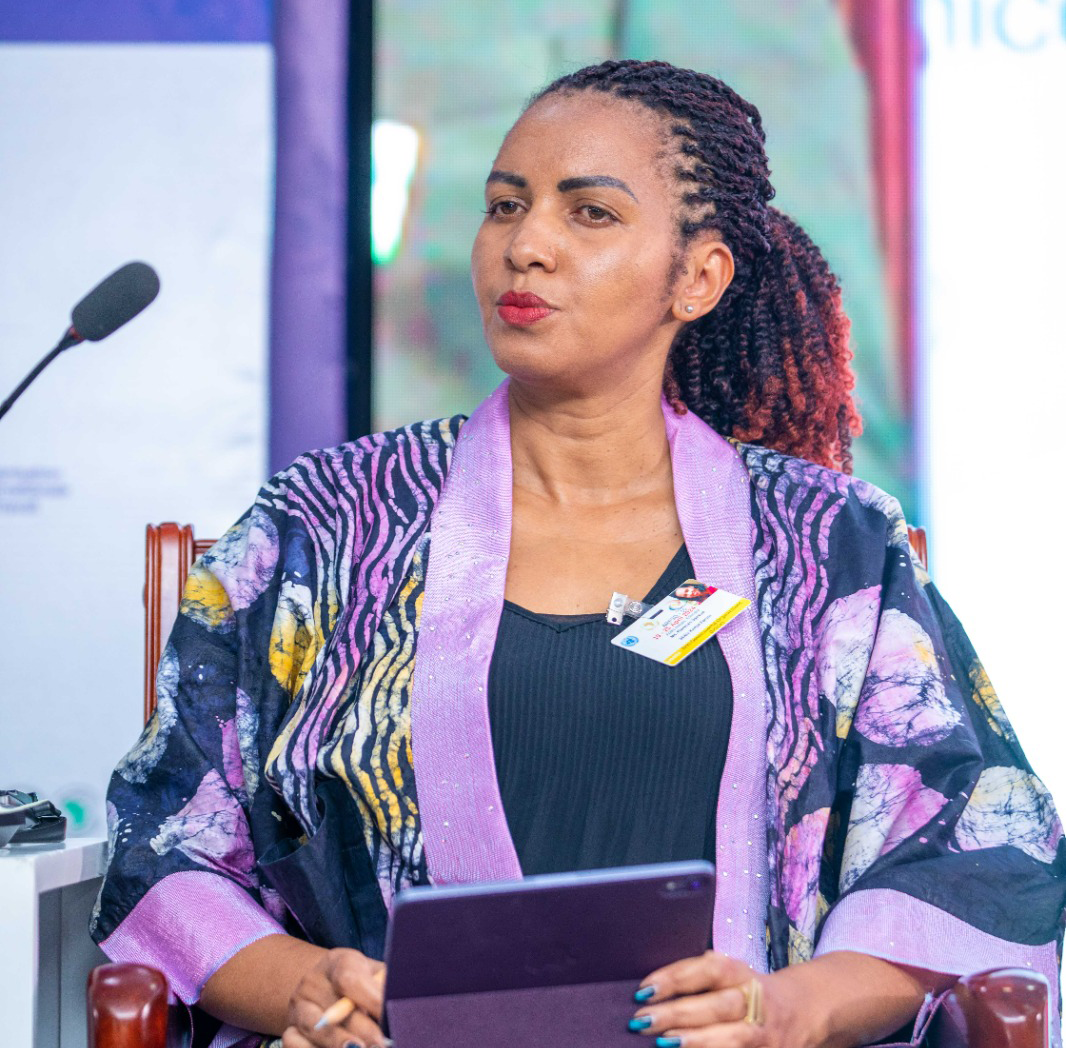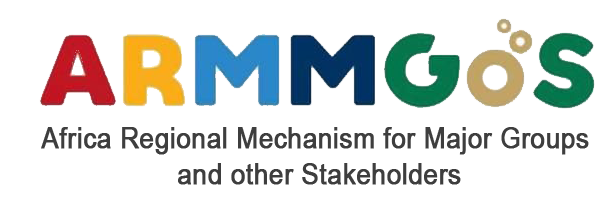ARMMGoS Structures
ARMMGoS Constituents (Members)
ARMMGoS membership is open to civil society organizations and MGoS in Africa. Members are organizations that:
- Agree to the Victoria Falls Declaration, and ARCSEM’s Governance and Operations Document
- Submit a profile to the secretariat and self-define the Subregional and Thematic ARMMGoS Constituencies they should be placed in. Members may participate in multiple themes and sub-regions (in the case of region-wide organizations). But for voting purposes, each member can belong to only 1 primary Sectoral Constituency and/or 1 Geographic (sub-regional) Constituency.
- Provide a copy of the registration of the organization. In the absence of such, endorsement by at least one existing member of the respectiveconstituency, or a member of another Major Group and Other Stakeholder group will be necessary.
The list of members and their basic information should be available on the ARMMGoS website and readily accessible to anyone interested.
ARMMGoS Constituents would be asked to regularly renew their affiliation to the ARMMGoS by submitting an updated profile to the Secretariat every 2 years.
ARMMGoS is open to cooperating with Partners or Allies from civil society, which may include organizations or individuals/resource persons who are not part of the mechanism.
Focal Points
To strengthen accountability, ownership and self-organisation, each sectoral and sub- region (through national sustainable development platforms) will propose, elect (or select by consensus as may be decided by the constituency) their own Focal Point. The Focal Point position is organisational instead of individual, but each organisation should assign one main contact person, and one alternate (alternates may be identified from a different organization if necessary). They should be willing to serve for a term of three (3) years renewable to a maximum of two (2) terms upon re-election.
Note: There will be a handover period of 1 month from the former to the new Regional Coordination Committee.
Criteria for Focal Points:
1) Preferably regional and national organisation with working scope in Africa.
2) For sectoral constituency focal points, priority will be given to member-based organisations with the majority of their members belonging to the respective sectoral constituency.
3) Organisations should have interest, capacity and experiences in coordinating the CSOs in Africa in general, and within their constituencies, particularly in building common positions and facilitating collective decision-making processes.
4) Organisations should have the capacity and commitment to fulfill the responsibilities and task as constituency and sub-regional focal points as mentioned below, each organisation should assign 2 contact people (1 main, and 1 alternate) to coordinate the constituency.
5) The organisation should have an established office or address (called e.g. headquarters/secretariat) with an executive officer. It should have statutes which are transparent and accessible and if a network preferably a democratically adopted constitution.
In addition to the general criteria, constituencies can propose additional criteria, given they are arrived at by consensus within the constituency.

Advisory Group
An Advisory Group (AG) consisting of individuals that have extensive knowledge on sustainable development and civil society engagement supports the work of the RCC. Individuals recommended on the basis of their expertise by the Co-Chairs and/or members of RCC and subject to confirmation by a consensus of the RCC will constitute it. The AG’s role is to contribute to the full realization of the aims and vision of the ARCSEM. They shall provide timely advice and assistance to the RCC as requested by the Co-Chairs. They may be invited to deliberations but are not part of the decision making of the RCC. The number of AG shall not exceed 25% of the number of the RCC. Necessity and composition of AG is subject to periodic review by the RCC.
Thematic Working Groups
Thematic Working Groups are ad hoc cross-cutting groups of constituents that come together temporarily to work on a specific issue or prepare for a meeting or specific engagements. They are initiated by posting a thematic concept on the ARCSEM and a member is assigned as a coordinator, who reports to the RCC and makes it available online in the same fashion as regular reporting. The role of the TWGs is to develop regional common positions and/or messages for regional and global sustainable development processes on specific themes. It will be composed of volunteers from the various sub-regions, constituency groups and experts. Membership in them is voluntary and based on expertise or interest, rather than representation. A working group may be formed around a theme proposed by any member of the ARCSEM if:
(1) the topic is related to sustainable development; and
(2) at least 5 member-organizations from at least 5 sectoral constituencies commit to
work together on the theme.
Functional Working Groups
Functional working groups can also be formed to perform particular tasks necessary for the effective and efficient operations of the ARCSEM such as communications, etc.
Co-Chairs of the ARMMGoS
Three (3) Co-Chairs (one representing the sub-regions, one representing Major Groups, and representing Other Stakeholders) will provide leadership for ARMMGoS. The RCC members will nominate from amongst themselves (self-nominations allowed) and consensus must be reached within the RCC.
The Co-Chairs shall convene meetings of the RCC, prepare reports of the RCC to the ARMMGoS membership, and represent the ARMMGoS in liaising with external agencies.
The Co-Chairs may decide to have a division of labor amongst themselves (e.g. one can focus on sub-regions; another on sectoral constituencies; another on thematic working groups)
The Regional Coordination Committee (RCC)
All elected focal points will constitute the Regional Coordination Committee which will be collectively responsible for facilitating and coordinating the work of the entire ARMMGoS.
The responsibilities of the RCC collectively and the focal points individually are:
- Information: Sharing information on Agenda 2063, Agenda 2030 and the Sustainable Development Goals processes, and the ARMMGoS to CSOs in the region and feeding back information from constituencies to the ARMMGoS as a whole.
- Outreach: Inviting CSOs from the various constituencies to engage with Agenda 2063, Agenda 2030 and the Sustainable Development Goals and related processes through the ARMMGoS.
- Policy development: Facilitating process of coming up with common regional, sub-regional and/or constituency positions and recommendations through thematic working groups related to Agenda 2063, Agenda 2030 and sustainable development goals whenever possible.
- Engagement: Facilitating the participation of CSOs in regional, sub-regional and international processes in order to bring regional positions and perspectives related to sustainable development, while ensuring that such engagement is relevant to advocacy, education, organizing, mobilization and/or other related work of members at the national level.
- Capacity-building: Facilitating and supporting CSOs initiatives such as research, education, advocacy, campaigning and skills-sharing for more effective engagement on sustainable development processes.
- Test and enrich structures and processes for the ARCSEM: facilitating the collection and systematization of recommendations from the participants on how to improve the functioning of the ARMMGoS.
- Resource mobilization: Raising funds for all of the above and ensuring transparency and accountability to the constituencies.
